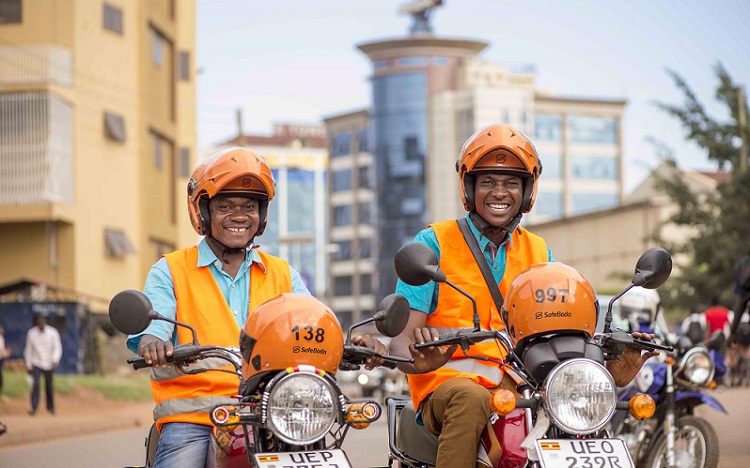Everyone knew it might happen someday, and that has indeed proven the case. Uber and Taxify are expanding beyond taxis in Africa.
Uber recently introduced a ride-hailing service for motorbike taxis, while Taxify rolled out its own service. The battleground for these services, at least initially? The Ugandan capital Kampala, though surely they will expand further across Africa.
But wait. Uganda already has an “Uber for boda bodas” in the form of SafeBoda, which might be forgiven for fearing the arrival of Uber and Taxify on its turf. That, however, is not the case, according to co-founder Alastair Sussock.
He says the fact the two major global companies are entering the motorcycle taxi hailing space, and choosing to do so in Kampala, validates SafeBoda’s assumptions.
“It’s great to see validation for the boda sector that Uber and Taxify are interested and piloting in this segment in Kampala. The fact they chose Kampala to first launch boda as an option on their car platform is good validation that the smartphone market is looking healthy,” Sussock told Disrupt Africa.
For now, Uber and Taxify are just piloting. Yet it is highly likely this option will be expanded to other markets, as was the case with cash payments, meaning similar businesses elsewhere must be prepared for their arrival. One such business is the Rwanda-based SafeMotos, which announced earlier this week it is set to expand to the Democratic Republic of Congo (DRC).
Like Sussock, SafeMotos chief executive officer (CEO) Barrett Nash claims not to be too concerned by the developments. He cites the local relevance of Africa-developed applications like SafeMotos and SafeBoda as a reason for this.
“All the applications are following similar design languages, which are airdropped from the West,” he said.
“We believe that technology users in Africa, who have not grown up with legacy systems, need different design metaphors, specifically considering that a majority of users are unfamiliar with reading digital maps. This is why SafeMotos has taken the map away from our home screen, and why we are developing a USSD-based system for customers.”
Sussock believes SafeBoda will be able to compete with Uber and Taxify given the reputation it has built over the last few years, and its focus on quality and safety.
“On our side, we have been working to create a professional, safe, affordable boda market in Kampala for more than three years, so nothing on our side will change, it will likely make us grow even faster,” he said.
“We spend around four full days onboarding a driver – quite different to other ride hailing approaches who spend one or two hours. We foster a community that then sticks and the drivers are the face of everything we do – drivers don’t leave.”
SafeBoda, Sussock said, is growing faster in terms of rides and presence on the streets of Kampala than ever before, and focused on scaling.
“We are pretty excited to see this growth and our driver community,” he said.
“In addition, we see lots of opportunity in East Africa and West Africa, for our driver community-led model has worked so well in Kampala. Our investors who come from Silicon Valley, Africa, Europe and Asia believe in us to take our model to other cities which have the same challenges, so these are exciting times.”
Nash also has expansion in mind for SafeMotos, and says he refuses to involved in price wars. Remaining focused is key.
“SafeMotos is not wanting to get stuck in the price war in other regions. It’s our belief that until a company is making money, then everyone is using subsidised trips to lure customers and haven’t actually determined the value customers are receiving,” he said.
“For SafeMotos, we have double down on segments where we create value, like corporate customers – which we averaged six per cent week-on-week growth over 2017 – and female drivers for female customers.”
He said SafeMotos’ current strategy was to go into tough markets like Kinshasa, and expand beyond smartphones to feature phones.
“This means we see ourselves as complementary to, rather than in competition, with Taxify and Uber,” said Nash said.
SafeBoda, meanwhile, plans to keep its focus on growth and serving its drivers and passengers.
“Our entire team, including our engineers, are based in Kampala so we are able to iterate well to serve our customers. For example, our PAIR feature comes from being in the streets of Kampala every day rather than having teams in a city far away not near the action.”
The streets of Kampala are the scene for a corporate versus startup battle for market share, but SafeBoda is confident it can hold its own. The likes of SafeMotos will be looking on for clues as to what Uber and Taxify will do next. Let the games commence.


